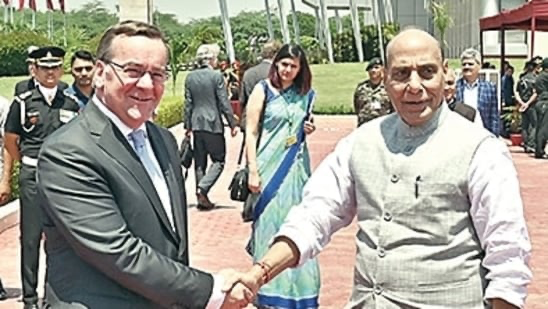
Disclaimer: Copyright infringement not intended.
Context
- The visit of German Defence Minister Boris Pistorius to India for talks with Indian Defence Minister Rajnath Singh.
Details
Introduction:
- German Defence Minister Boris Pistorius visited India to bolster bilateral defense cooperation and explore stronger industrial partnerships.
- The talks focused on the P-75 India project, aimed at building advanced submarines in India under the strategic partnership model.
P-75 India Project:
- The P-75 India project is a significant Make in India program to strengthen the Indian Navy's undersea capabilities.
- Germany expressed enthusiasm for participating in the P-75I competition and building submarines in India.
Bilateral Defense Cooperation:
- Both countries reviewed ongoing defense cooperation and discussed ways to enhance collaboration, particularly in defense industrial partnerships.
- Germany's participation in P-75I was welcomed by the Indian side.
Strategic Partnership Model:
- The SP model involves indigenous manufacturing of major defense platforms in India with a foreign original equipment manufacturer (OEM).
- German company ThyssenKrupp Marine Systems (TKMS) is in the race to secure the submarine-building contract.
Foreign Participants:
- In January 2020, two Indian shipbuilders (Mazagon Dock Shipbuilders Limited and L&T) and five foreign shipbuilders (including TKMS) were cleared to participate in P-75I.
- France's Naval Group and Russia's Rubin Design Bureau withdrew from the competition, making TKMS a leading contender.
Timeline and Indigenization:
- P-75I has faced delays, but a memorandum of understanding (MoU) between TKMS and Mazagon Dock Shipbuilders is expected to be concluded during the visit.
- Submarines built under P-75I will have air independent propulsion (AIP) systems and a minimum of 45% indigenization in the first submarine, increasing to 60% in the sixth.
Future Prospects:
- If a contract is awarded to a contender, the first submarine will be delivered after a decade.
- India aims to operate a fleet of 18 new conventional submarines and six nuclear-powered submarines.
India-Germany Strategic Partnership:
- The countries have had a strategic partnership since 2000 and have strengthened ties through intergovernmental consultations.
- Defence Minister Singh highlighted opportunities for German investments in India's defense production sector and participation in defense industrial corridors.
Shared Goals and Complementarity:
- Singh emphasized the potential for a symbiotic relationship based on shared goals and complementarity of strengths.
- Germany expressed openness to selling submarines to India, emphasizing the importance of reducing India's dependence on Russian weapons.

About Germany
- Germany, officially known as the Federal Republic of Germany, is a country located in Central Europe.
- It is one of the most populous and economically powerful nations in Europe.
- Germany has a rich cultural heritage and is known for its contributions to science, technology, arts, and literature.
Geography:
- Germany shares borders with nine countries, including Austria, Belgium, Denmark, France, Luxembourg, the Netherlands, Poland, Switzerland, and the Czech Republic.
- The country has diverse landscapes, including the Bavarian Alps, the Black Forest, the Rhine River, and the North Sea coastline.
Political System:
- Germany operates under a federal parliamentary republic system.
- The head of state is the President, who holds a mostly ceremonial role.
- The head of government is the Chancellor, who exercises executive power.
- Germany has a multi-party system, with the Christian Democratic Union and Social Democratic Party being the two major political parties.
Economy:
- Germany has one of the largest economies in the world and is known for its highly developed industrial and technological sectors.
- It is a global leader in automotive manufacturing, engineering, chemical production, and renewable energy.
- Key industries include automotive, machinery, pharmaceuticals, information technology, and financial services.
- Germany is a major exporter of goods and has a strong focus on innovation and research and development.
History:
- Germany has a complex history marked by significant events such as the Holy Roman Empire, the Protestant Reformation, and both World Wars.
- After World War II, Germany was divided into East Germany (German Democratic Republic) and West Germany (Federal Republic of Germany) until reunification in 1990.
- The country underwent significant rebuilding and transformation, becoming a symbol of European integration and stability.
International Relations:
- Germany is a key member of the European Union and plays a prominent role in shaping EU policies.
- It maintains close ties with neighboring countries and is actively involved in international diplomacy.
- Germany is known for its commitment to environmental sustainability and has been a leader in renewable energy adoption.
- The country promotes cultural exchange and is home to numerous international organizations, such as the United Nations (UN) and NATO.
India Germany Relations
- India and Germany have a longstanding history of bilateral relations, which were formalized with the establishment of diplomatic ties in 1951.
- The foundation of defense cooperation between the two countries was laid during the Cold War era, with West Germany providing military equipment and training to India.
Strategic Partnership:
- India and Germany declared a strategic partnership in 2000, signifying the deepening of their bilateral relations across various sectors, including defense.
- The strategic partnership has been further strengthened through regular high-level visits, joint exercises, defense dialogues, and defense cooperation agreements.
Defense Cooperation Agreements:
- Memorandum of Understanding (MoU) on Defense Cooperation (2006): The agreement aimed at enhancing defense cooperation, exchange of military delegations, and joint military exercises.
- Joint Declaration of Intent on Defense Cooperation (2015): The declaration focused on promoting cooperation in defense technology, defense industries, research and development, and defense procurement.
Defense Exchanges and Dialogues:
- Defense Ministerial Visits: High-level visits by defense ministers from both countries have played a crucial role in strengthening defense ties and exploring areas of collaboration.
- Defense Policy Group: The Defense Policy Group meetings serve as a platform for defense officials to discuss defense cooperation, policy coordination, and strategic issues.
Industrial Partnerships and Make in India:
- Germany has expressed interest in India's Make in India initiative, particularly in the defense sector.
- The Strategic Partnership (SP) model, introduced by India, envisions indigenous manufacturing of major defense platforms in collaboration with foreign original equipment manufacturers (OEMs).
- Germany's participation in the P-75 India project, aimed at building advanced submarines in India, underlines the potential for stronger industrial partnerships between the two countries.
Technological Collaboration:
- Research and Development: India and Germany have collaborated on defense research and development projects, focusing on areas such as aerospace, maritime security, and cyber defense.
- Defense Technology Cooperation: Both countries have explored avenues for joint defense technology development, transfer, and sharing of best practices.
Maritime Security and Naval Cooperation:
- India and Germany have recognized the importance of maritime security in the Indo-Pacific region.
- Naval Cooperation: Naval exchanges, port visits, and joint exercises have enhanced cooperation in areas like anti-piracy operations, maritime domain awareness, and disaster response.
Major Developments in India Germany Relations:
- In 2011, the two countries held their first intergovernmental consultations, which were held at the level of prime ministers.
- In 2015, India and Germany signed a civil nuclear cooperation agreement, which opened up the Indian market to German nuclear technology.
- In 2017, India and Germany signed a defense cooperation agreement, which deepened their cooperation in areas such as defense procurement, training, and exercises.
- In 2020, India and Germany announced a joint initiative to develop a green hydrogen economy.
|
PRACTICE QUESTION
Q. Consider the following statements about project P75I
1. P75I succeeded the P75
2. It is a part of the Indian Navy's 30 year plan for importing submarines from Russia
Which of the above statements are correct?
A. 1 only
B. 2 only
C. Both 1 and 2
D. Neither
Answer: A
|
https://www.hindustantimes.com/india-news/germany-plans-to-build-6-new-submarines-in-tie-up-with-india-101686075628928.html




